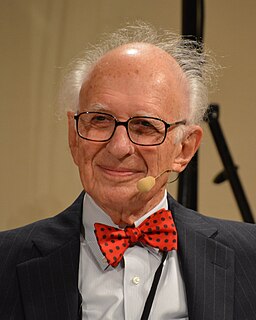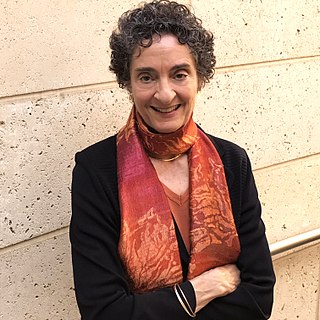
Eric Richard Kandel is an Austrian-born American medical doctor who specialized in psychiatry, a neuroscientist and a professor of biochemistry and biophysics at the College of Physicians and Surgeons at Columbia University. He was a recipient of the 2000 Nobel Prize in Physiology or Medicine for his research on the physiological basis of memory storage in neurons. He shared the prize with Arvid Carlsson and Paul Greengard.

Linda Brown Buck is an American biologist best known for her work on the olfactory system. She was awarded the 2004 Nobel Prize in Physiology or Medicine, along with Richard Axel, for their work on olfactory receptors. She is currently on the faculty of the Fred Hutchinson Cancer Research Center in Seattle.
Sharmila Bhattacharya is the Chief Scientist for Astrobionics and head of the Biomodel Performance and Behavior laboratory at NASA Ames Research Center. She is the Subject Matter Expert of the US Senate Committee on Commerce, Science and Transportation and the Principal Investigator for Biomodel Performance Laboratory of Space Biosciences Division of NASA Ames Research Center. She was part of a project which sent fruit flies into space to study human illnesses and to study the effects of space radiation, both which will help space explorers. She has received the Ames Honor Award the successful launch of the MVP-Fly-01 experiment, 2018, NASA Exceptional Scientific Achievement Medal, 2018, etc.

Carla J. Shatz is an American neurobiologist and an elected member of the American Academy of Arts and Sciences, the American Philosophical Society, the National Academy of Sciences, and the National Academy of Medicine.
Rachel Wilson is a professor of neurobiology at Harvard Medical School and is a Howard Hughes Medical Institute Investigator. Wilson's work integrates electrophysiology, neuropharmacology, molecular genetics, functional anatomy, and behavior to explore how neural circuits are organized to react and sense a complex environment.

Axon terminals are distal terminations of the telodendria (branches) of an axon. An axon, also called a nerve fiber, is a long, slender projection of a nerve cell, or neuron, that conducts electrical impulses called action potentials away from the neuron's cell body, or soma, in order to transmit those impulses to other neurons, muscle cells or glands.
Steven M. Reppert is an American neuroscientist known for his contributions to the fields of chronobiology and neuroethology. His research has focused primarily on the physiological, cellular, and molecular basis of circadian rhythms in mammals and more recently on the navigational mechanisms of migratory monarch butterflies. He was the Higgins Family Professor of Neuroscience at the University of Massachusetts Medical School from 2001 to 2017, and from 2001 to 2013 was the founding chair of the Department of Neurobiology. Reppert stepped down as chair in 2014. He is currently distinguished professor emeritus of neurobiology.
Andrea Hilary Brand is the Herchel Smith Professor of Molecular Biology and a Fellow of Jesus College, Cambridge. She heads a lab investigating nervous system development at the Gurdon Institute and the Department of Physiology, Development and Neuroscience. She developed the GAL4/UAS system with Norbert Perrimon which has been described as “a fly geneticist's Swiss army knife”.
Christine Elizabeth Holt FRS, FMedSci is a British developmental neuroscientist.

Michael Morris Rosbash is an American geneticist and chronobiologist. Rosbash is a professor and researcher at Brandeis University and investigator at the Howard Hughes Medical Institute. Rosbash's research group cloned the Drosophila period gene in 1984 and proposed the Transcription Translation Negative Feedback Loop for circadian clocks in 1990. In 1998, they discovered the cycle gene, clock gene, and cryptochrome photoreceptor in Drosophila through the use of forward genetics, by first identifying the phenotype of a mutant and then determining the genetics behind the mutation. Rosbash was elected to the National Academy of Sciences in 2003. Along with Michael W. Young and Jeffrey C. Hall, he was awarded the 2017 Nobel Prize in Physiology or Medicine "for their discoveries of molecular mechanisms controlling the circadian rhythm".

Michael Warren Young is an American biologist and geneticist. He has dedicated over three decades to research studying genetically controlled patterns of sleep and wakefulness within Drosophila melanogaster.
Rao Yi is a Chinese neurobiologist. A graduate of the University of California, San Francisco, Rao held a Helen Hay Whitney fellowship at Harvard University and was on the faculty of Washington University in St. Louis and Northwestern University before moving back to China to take up the deanship of Peking University's School of Life Sciences in 2007. He is currently the director the IDG/McGovern Institute for Brain Research at Peking University. He took office as the President of the Capital Medical University on June 25, 2019.
Ian Anthony Meinertzhagen is a Canadian neurobiologist, a University Research Professor at Dalhousie University, in Halifax, Nova Scotia and Senior Fellow at the Janelia Research Campus of the Howard Hughes Medical Institute in Ashburn, Virginia. He is a graduate of the Universities of Aberdeen (BSc) and St. Andrews and undertook postdoctoral work at the Australian National University and Harvard University. His research has pioneered studies on simple nervous systems of invertebrate species, especially the Drosophila visual system and the diminutive chordate nervous system of the ascidian tadpole larva,.
Ruth Lehmann is a developmental and cell biologist. She is the Director of the Whitehead Institute for Biomedical Research, succeeding David Page. She previously was affiliated with the New York University School of Medicine, where she was the Director of the Skirball Institute of Biomolecular Medicine, the Laura and Isaac Perlmutter Professor of Cell Biology, and the Chair of the Department of Cell Biology. Her research focuses on germ cells and embryogenesis.
Rosalind Anne Segal is an American neurobiologist. She is a Professor of Neurobiology at Harvard Medical School and the Co-Chair of the Cancer Biology Department at the Dana Farber Cancer Institute. Segal's work employs modern methods of cell and molecular biology to study the development of the mammalian brain with the goal of understanding how disruption of this normal process leads to the formation of brain malignancies.

The Department of Neurobiology at Harvard Medical School is located in the Longwood Medical Area of Boston, MA. It is consistently ranked as one of the top programs in Neurobiology and behavior in the world. The Department is part of the Basic Research Program at Harvard Medical School, with research pertaining to development of the nervous system, sensory neuroscience, neurophysiology, and behavior. The Department was founded by Stephen W. Kuffler in 1966, the first department dedicated to Neurobiology in the world. The mission of the Department is “to understand the workings of the brain through basic research and to use that knowledge to work toward preventive and therapeutic methods that alleviate neurological diseases”.
Bernardo L. Sabatini is an American neuroscientist who is the Alice and Rodman W. Moorhead III Professor of Neurobiology at Harvard Medical School.
Marian Bille Carlson is a geneticist and the Director of Life Sciences at the Simons Foundation. She is a member of the National Academy of Sciences and a past president of the Genetics Society of America.

Caroline Palavicino-Maggio is an American neuroscientist and Research Fellow in the Department of Neurobiology at Harvard Medical School. Palavicino-Maggio explores how gene expression in amine neurons and neural circuits leads to changes in social behavior, specifically aggression, in Drosophila. Palavicino-Maggio is committed to mentoring and inspiring first-generation students in STEM and serves as the Director of Outreach for the Journal of Emerging Investigators, an open-access journal that publishes research conducted by middle and high school students as a means to expose young and underrepresented future scientists to academic research and the publishing process.







